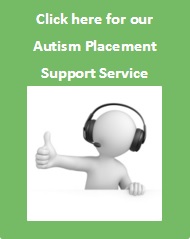‘It is time for all of us to think autism’
This update has been produced by the Social Care, Local Government and Care Partnership Directorate, Department of Health and was published on 2nd April 2014 marking World Autism Day.
It assesses the progress made since the Autism Act 2009 and its subsequent strategy Fulfilling and Rewarding Lives published in 2010. Many individuals with autism, their families and the professionals who support them have asked if the legislation has had a real impact on those with autism in England and this update attempts to answer that question.
The update stands firmly by the original guidance. Furthermore, it hopes that the new Children and Families Act 2014 will complement and feed into it as there is a focus on transition and both further education and employment opportunities for young people with special educational needs.
However, it is acknowledged that the reasons for the Autism Act’s conception remain and whilst there are successes there is still a great deal of work to be done on both local and national levels.
Areas highlighted include:
- Gaps in Provision
- Issues with achieving aspirations in employment
- NHS, criminal justice and benefits systems not making adjustments to individuals with autism’s needs
The clear emphasis throughout the update is on autism awareness raising and training. It is vital that the professionals working with and making decisions which affect the lives of individuals with autism have had the relevant training as stipulated by Skills for Care.
15 Priority Challenges for Action
These action points have been determined by individuals with autism, their families and professionals. They formulate the key areas to be worked upon moving forward.
An equal part of my local community
1. I want to be accepted as who I am within my local community. I want people and organisations in my community to have opportunities to raise their awareness and acceptance of autism.
2. I want my views and aspirations to be taken into account when decisions are made in my local area. I want to know whether my local area is doing as well as others.
3. I want to know how to connect with other people. I want to be able to find local autism peer groups, family groups and low level support.
4. I want the everyday services that I come into contact with to know how to make reasonable adjustments to include me and accept me as I am. I want the staff who work in them to be aware and accepting of autism.
5. I want to be safe in my community and free from the risk of discrimination, hate crime and abuse.
6. I want to be seen as me and for my gender, sexual orientation and race to be taken into account.
The right support at the right time during my lifetime
7. I want a timely diagnosis from a trained professional. I want relevant information and support throughout the diagnostic process.
8. I want autism to be included in local strategic needs assessments so that person-centred local health, care and support services, based on good information about local needs, is available for people with autism.
9. I want staff in health and social care services to understand that I have autism and how this affects me.
10. I want to know that my family can get help and support when they need it.
11. I want services and commissioners to understand how my autism affects me differently through my life. I want to be supported through big life changes such as transition from school, getting older or when a person close to me dies.
12. I want people to recognise my autism and adapt the support they give me if I have additional needs such as a mental health problem, a learning disability or if I sometimes communicate through behaviours which others may find challenging.
13. If I break the law, I want the criminal justice system to think about autism and to know how to work well with other services. Developing my skills and independence and working to the best of my ability.
14. I want the same opportunities as everyone else to enhance my skills, to be empowered by services and to be as independent as possible.
15. I want support to get a job and support from my employer to help me keep it.
How will this be monitored?
- The Autism Act requires that the strategy must be reviewed periodically, hence this review.
- The update states that this will take place again within the next 5 years.
Finance
Revenue and capital funding of £4.5 million is being made available from central government. This is very welcome as many agencies have stated that progress has been halted from lack of financial support initially. This includes the launch of the Autism Innovation Fund to help support forward thinking work across the country.
Four key areas have been identified for the invitation of tenders:
- Advice and information
- Gaining and growing skills for independence
- Early intervention and crisis prevention
- Employment, particularly for individuals to have the use of apprenticeships
Applications will need to demonstrate the involvement of individuals with autism, innovation and partnership work.
Next steps
- The update sets out time frames for the local authority, NHS and partners to keep local implementation work on track.
- New statutory guidance will be revealed later in 2014.
How was the update compiled?
Each local authority area was asked to complete two self assessment questionnaires. You can access your local authority’s response at www.improvinghealthandlives.org.uk/projects/autism2013



